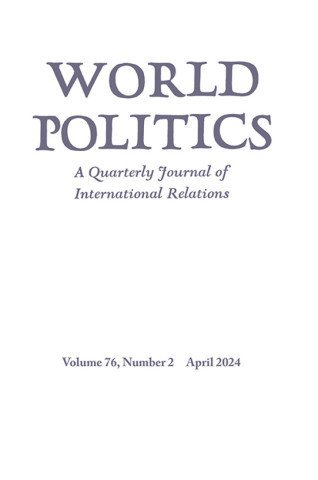适应性政治经济学:迈向新范式
IF 4.5
1区 社会学
Q1 INTERNATIONAL RELATIONS
引用次数: 0
摘要
政治经济学的传统范式通常将活生生的、复杂的、适应性强的社会系统视为类似机器的物体。这种处理方式促使政治经济学家使用机械模型过度简化复杂的大型社会进程,或完全忽略这些进程。在发展过程中,这导致了理论上的死胡同、琐碎的议程或失败的公共政策。本文提出了另一种范式:适应性政治经济学。它承认社会系统是复杂的,而不是复杂的;复杂性可以是有序的,而不是混乱的;社会科学家应该发展概念、方法和理论来阐明复杂性的秩序,而不是将其过度简化。作者通过描绘经济和制度变革的共同演进,说明了适应性政治经济学的一种应用。这种方法得出了机械、线性的发展模式所忽略的新的重要结论,包括市场建设机构与市场维持机构在外观和功能上的不同。本文章由计算机程序翻译,如有差异,请以英文原文为准。
Adaptive Political Economy: Toward a New Paradigm
The conventional paradigm in political economy routinely treats living, complex, adaptive social systems as machine-like objects. This treatment has driven political economists to oversimplify big, complex social processes using mechanical models, or to ignore them altogether. In development, this has led to theoretical dead ends, trivial agendas, or failed public policies. This article proposes an alternative paradigm: adaptive political economy. It
recognizes that social systems are complex, not complicated; complexity can be ordered, not messy; and social scientists should be developing the concepts, methods, and theories to illuminate the order of complexity, rather than oversimplifying it. The author illustrates one application of adaptive political economy by mapping the coevolution of economic and institutional change. This approach yields fresh, important conclusions that mechanical, linear models of development have missed, including that market-building institutions look and function differently from market-sustaining ones.
求助全文
通过发布文献求助,成功后即可免费获取论文全文。
去求助
来源期刊

World Politics
Multiple-
CiteScore
8.40
自引率
0.00%
发文量
24
期刊介绍:
World Politics, founded in 1948, is an internationally renowned quarterly journal of political science published in both print and online versions. Open to contributions by scholars, World Politics invites submission of research articles that make theoretical and empirical contributions to the literature, review articles, and research notes bearing on problems in international relations and comparative politics. The journal does not publish articles on current affairs, policy pieces, or narratives of a journalistic nature. Articles submitted for consideration are unsolicited, except for review articles, which are usually commissioned. Published for the Princeton Institute for International and Regional Affairs
 求助内容:
求助内容: 应助结果提醒方式:
应助结果提醒方式:


